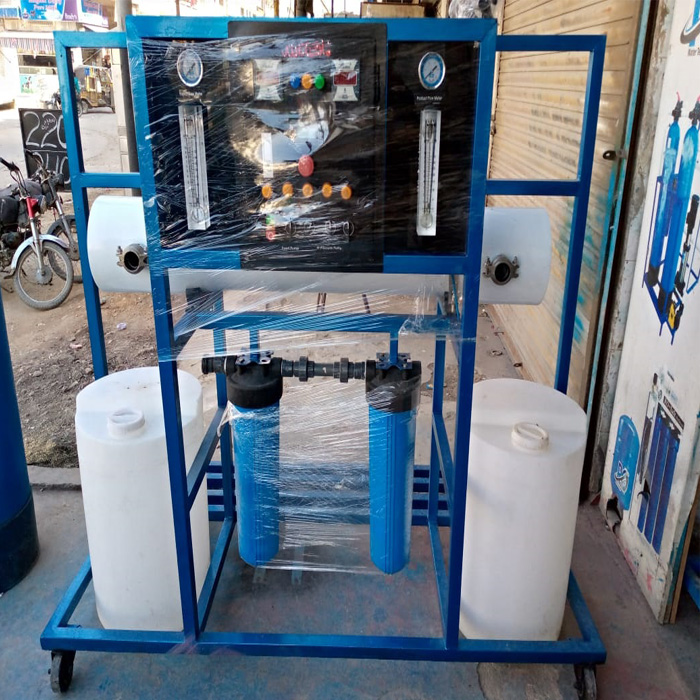Commercial RO Plant(Introduction to Commercial RO Plants):
Reverse Osmosis (RO) is a water purification technology that utilizes a semi-permeable membrane to remove ions, unwanted molecules, and larger particles from drinking water. A Commercial RO Plant refers to a larger scale RO system designed for the treatment of water in various commercial and industrial applications. This technology has gained significant traction due to the growing need for clean, potable water and the rising concerns regarding water quality in many parts of the world.
Importance of Commercial RO Plants
- Meeting Water Quality Standards: Many industries require high-quality water for their processes. Commercial RO Plants ensure that the water meets stringent quality standards by removing contaminants such as salts, heavy metals, and microorganisms.
- Sustainability and Environmental Responsibility: With the increasing emphasis on sustainability, businesses are turning to RO technology to minimize their environmental impact. By recycling water and reducing waste, RO Plants contribute to sustainable water management practices.
- Cost-Effective Solution: While the initial investment in a commercial RO system may be significant, the long-term savings on water sourcing and treatment make it a financially viable solution. The reduced need for chemical treatment and lower energy costs further enhance its appeal.
Operation of Commercial RO Plants
A Commercial RO Plant operates through a series of processes:
- Pre-Treatment: Before water undergoes reverse osmosis, it typically undergoes pre-treatment to remove larger particles, such as sediments and suspended solids. This step often includes filtration and chemical dosing to prevent membrane fouling.
- Reverse Osmosis: During this critical phase, water is pumped through a semi-permeable membrane under high pressure. The membrane allows only water molecules to pass through while rejecting dissolved salts, organic compounds, and other impurities.
- Post-Treatment: After the RO process, the purified water may undergo further treatment to enhance its quality. This could include remineralization, pH adjustment, and disinfection to ensure the water is safe for consumption and suitable for industrial use.
- Monitoring and Control: Advanced commercial RO plants are equipped with monitoring systems that ensure optimal performance. These systems track parameters such as flow rate, pressure, and water quality to ensure the plant operates efficiently and effectively.
Benefits of Commercial RO Plants
- High Purity Water: Commercial RO systems are capable of producing water with a high purity level, often exceeding 90% removal of dissolved solids and contaminants.
- Versatility: RO technology can be tailored to meet the specific requirements of various industries, including food and beverage, pharmaceuticals, electronics, and more. It can also treat different water sources, such as municipal, brackish, or seawater.
- Reduced Chemical Usage: By relying on physical filtration rather than chemical processes, RO plants significantly decrease the need for chemical coagulants and flocculants, making the water treatment process more environmentally friendly.
- Low Maintenance Costs: Despite the initial setup costs, commercial RO plants generally have lower operational and maintenance costs compared to traditional water treatment systems.
Applications of Commercial RO Plants
- Food and Beverage Industry: Ensures that water used in production processes meets safety standards, impacting the quality and taste of the final product.
- Pharmaceutical Manufacturing: Provides ultra-pure water essential for drug formulation, cleaning, and sterilization processes.
- Power Plants: Supplies demineralized water for steam generation and cooling processes, enhancing efficiency and reducing scaling issues.
- Mining and Mineral Processing: Treats water used in various processes, including mineral extraction and separation, ensuring compliance with environmental regulations.
- Municipal Water Supply: Enhances the quality of drinking water provided to communities, especially in regions with limited freshwater resources.
Conclusion
Commercial RO Plants represent a vital component in addressing global water challenges. As industries strive for greater sustainability and higher quality standards, the role of RO technology becomes increasingly significant. By ensuring a reliable supply of purified water, commercial RO plants not only enhance operational efficiency but also contribute to the overall health and well-being of communities and ecosystems.
